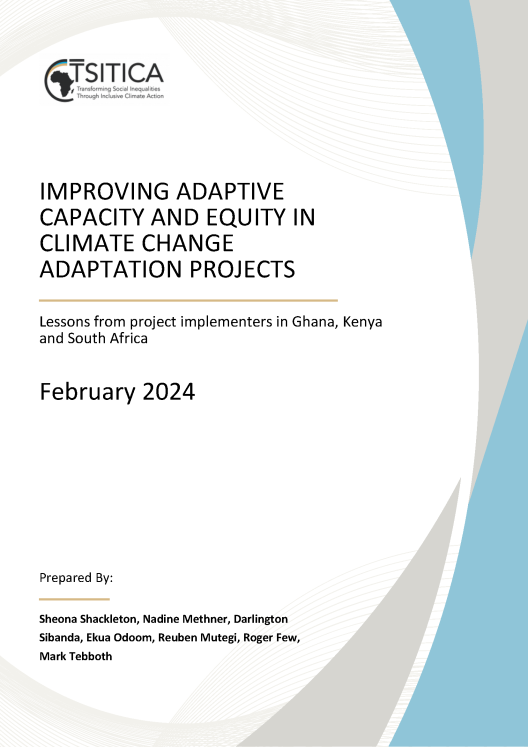Improving adaptive capacity and equity in climate change adaptation projects. Lessons from project implementers in Ghana, Kenya and South Africa
Sheona Shackleton, Nadine Methner, Darlington Sibanda, Ekua Odoom, Reuben Mutegi, Roger Few, Mark Tebboth
TSITICA Project Working Paper no. 13, February 2024.
Published by ARUA Centre of Excellence in Climate Change and Development & African Centre of Excellence for Inequality Research.

The final paper in the working paper series of the Transforming Social Inequalities Through Inclusive Climate Action (TSITICA) Project’s is informed by interviews with practitioners from 32 place-based climate change adaptation projects in three African countries to find out if and how their projects worked with equity, and if and how they built both specific and generic adaptive capacity to strengthen livelihoods and reduce vulnerability. The interviews were guided by the authors' framework that combines elements from existing frameworks on livelihoods and assets; development, climate change and adaptive capacity; and equity dimensions.
Using their framework, the authors explore:
- project activities that enhance capacities to respond to climate risks (specific adaptive capacity); and that address livelihood and human development needs and reduce poverty and inequality (generic adaptive capacity);
- whether and how local priorities, values, practices, and knowledge were considered in project design and implementation (recognitional equity);
- whether and how (processes by which) local participants and other actors were included in the design and implementation of projects and the steps/measures taken to strengthen inclusion (procedural equity);
- who was included in projects and how, and who benefited (distributional equity);
- contextual and other challenges to building adaptive capacity and ensuring equity; and lastly
- outcomes that could be considered transformative (stories of agency and change).
The researchers analyse the interview data to identify the factors and processes that enabled projects to reduce vulnerability; improve livelihoods and adaptive capacity; and address recognitional, procedural and distributional equity while simultaneously reducing climate risk. Based on this analyses, the authors formulate a list of lessons that can be applied when climate change adaptation projects are being designed, and when they are being implemented. Read more
TSITICA was a collaborative, multi-country interdisciplinary research project. It brought together two ARUA Centres of Excellence with researchers from the universities of Ghana, Nairobi and Cape Town, and from the UK universities of Bristol, East Anglia and Manchester and the London School of Economics. The support of the African Research Universities Alliance and UK Research and Innovation are gratefully acknowledged. Visit project website.
